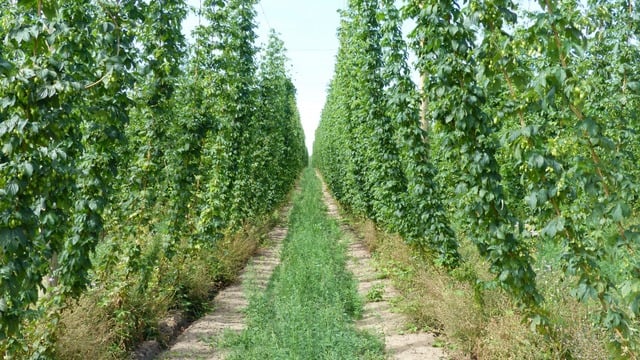
Northern Michigan has all the preconditions to propagate quality hops: long day lengths to flower and produce adequate cone yields and those specific chilling requirements with winter temperatures below 40 degrees F for at least one to two months. Ideal conditions for hop growth include sufficient spring moisture (check) followed by significant periods of summer sun and balmy heat (check) to ensure ample full development of those lovely chemical compounds. Also, marketable yields of hops are produced in well-drained, deep, sandy loam soils (check, check, check).
Some of Michigan’s best ag operations are on the till plains, or ground moraine, which are gently undulating lands that are fertile with soils that are predominately clay loams and sandy loams, capable of supporting diversified agriculture indefinitely, provided they are handled properly.
In fact, Michigan actually used to be a lupulin Shangri-La back in the mid-1800s. Hops and cherries were the state’s biggest crops back then, until the hop industry was eradicated by downey mildew, pesky insects called hop louse and drought. But today, Michigan is once again becoming a hop agriculture hub, growing both large and small farms, building tall, elaborate trellis systems and resurrecting a local beer ingredient for the Wolverine State’s thriving craft beer industry and beyond.
Outside of the Pacific Northwest, Michigan is actually the hop growing leader with an estimated 650 acres in production with more under development, according to our recent hop report. But let’s put that in perspective: The Pacific Northwest planted 51,115 acres for a record season in 2016.
Looking to up that acreage in the Midwest, MI Local Hops is one of the latest farms fueling Michigan’s hop growing rebirth. The 200-acre hop farm in Williamsburg, Mich., is just outside of Traverse City, and its rolling fields and quality products are already attracting plenty of commercial craft brewers. It’s been a multi-year labor of love to get the operation off the ground, according to Jason Warrens, CEO of MI Local Hops.
“Myself and our COO Dan Taber began researching hops and related growing and processing back in 2013,” Warrens said. “We both have agricultural and food processing backgrounds with larger farms and companies in the cherry industry and felt that there was an opportunity for establishing a larger hop operation in Northern Michigan given the growing conditions, the availability of water and the reasonable price of available farmland.”
The group’s research kept pointing to Dan Wiesen at Empire Hops as being the most knowledgeable grower in Michigan. Most importantly, Wiesen has a good reputation with brewers for producing quality products, which isn’t that easy.
“At the time Dan was involved with other partners, so we decided to hire him on a contract basis to install our yards and provide us with custom farming services,” explained Mike Moran, manager of sales and marketing for MI Local. “We also hired his son Alex and Joe Brulotte, a third generation hop grower from Yakima, Wash., to manage our operations. Over the last year we have formed a joint venture with Empire Hops and are now working together to install yards, provide custom farming services and market hops.”
How is the progress going? Just watch the video below, enjoying its stellar downtempo soundtrack (“Hammerstrike” FTW!).
MI Local Hops June Update from QAP Podcasttc on Vimeo.
The video reflects everything that has happened in the month of June at the farm, which is quite a lot. You’ll see that that farm’s assembly of its Wolf 1000 picking machine is extremely close to being finished, and construction on the foundation and framework for its cold storage facility has begun (the 15,000-square-foot building will be where hops are pelletized and stored).
“In 2016 between our own yards and those of our associate growers we’re harvesting Centennial, Cascade, Crystal, Chinook, Michigan Copper, Willamette, Nugget and Columbus,” said Moran. “In 2017 we’ll be adding Magnum, and Zeus will be replacing Columbus. The variety I’m asked about every day is Michigan Copper, which is a Michigan Proprietary variety. It’s been hard to find anyone who has brewed with it because it’s been grown in such low volume. Its profile is supposed to be very similar to a Galaxy hop, and if that’s the case … we’ve got a winner.”
The proof is in the product. As of July 5, all Centennial hops from MI Local have been sold and contracted out for 2016, and this is only its first year of selling crops. That type of quality is going to be uber important to rebuilding an economically sustainable hop industry in Michigan and the Midwest.
“We feel that in order to create an economically feasible industry in the Midwest we ultimately have to produce hops of at least the same quality as growers out West at comparable prices,” said Warren. “Many of even the mid-size to smaller brewers in the Midwest are buying from out West to get the hops that they need at prices that they can ultimately afford. In order to achieve this goal, as an industry we need to achieve the economies of scale in our growing, harvesting and processing infrastructures that will allow us to be competitive and meet the increasing quality and food safety demands of our customers. That is not to say that everyone needs to grow on the scale that we are, there just needs to be an ability for us as a group to bring resources to bear that will allow us to bring the products from the growers to the market in a more economical manner.”
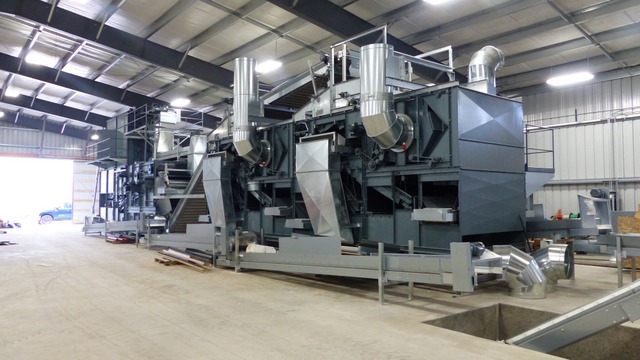
Since we had the folks at MI Local on the line, we decided to ask the group a few questions about its operation, peppered with some advice for craft brewers looking to work with a farm or broker.

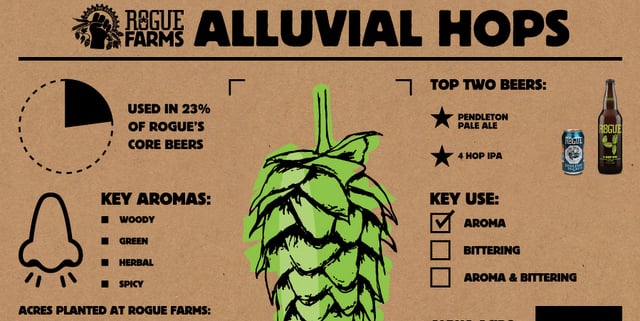
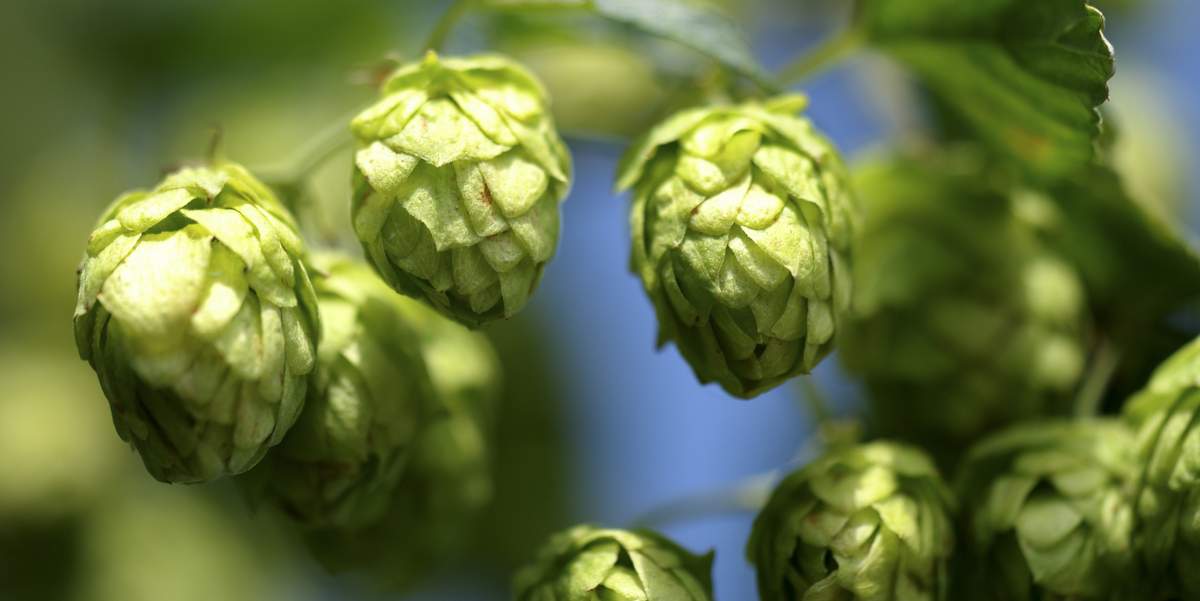
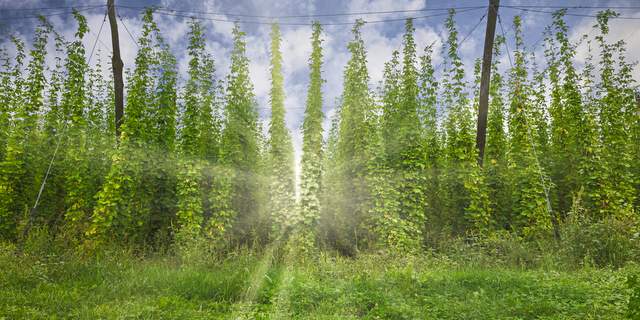
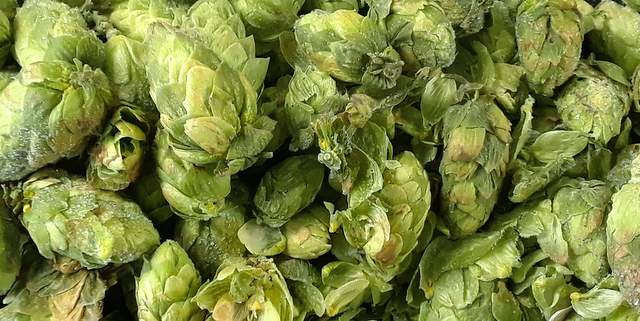
Great things in northern MI! The story of MI Local Hops and the history of Michigan hops https://t.co/CTTB6XdSAv via @craftbrewingbiz #Hops
Michael Moran liked this on Facebook.
RT @CraftBrewingBiz: Do you know about Michigan Copper? Check out this hot hop in our MI Local story @MILocalHops https://t.co/ImnRwzl2PO h…
RT @CraftBrewingBiz: Do you know about Michigan Copper? Check out this hot hop in our MI Local story @MILocalHops https://t.co/ImnRwzl2PO h…
#CraftBeer #CraftBrewing #Beer #BeerBiz MI Local Hops wants to help Michigan resurrect its rich hop growing her… https://t.co/pB0LY5bgRT
Beargrylls Sum liked this on Facebook.
RT @crsimp01: The story of MI Local Hops and the history of Michigan hops https://t.co/7rwJKfA8nk via @craftbrewingbiz
The story of MI Local Hops and the history of Michigan hops https://t.co/7rwJKfA8nk via @craftbrewingbiz